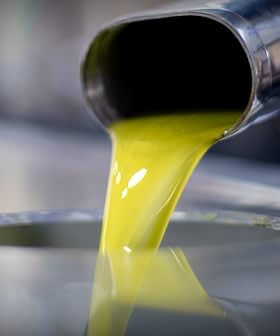 10.1K reads
10.1K readsHealth
Powerful Anti-Inflammatory Benefits of Olive Oil
Extra virgin olive oil contains over 36 phenolic compounds, with oleocanthal being a particularly powerful anti-inflammatory compound. Oleocanthal in olive oil acts similarly to NSAID ibuprofen in reducing inflammation by inhibiting COX‑1 and COX‑2 enzymes, but with fewer side effects, making it a safe and natural alternative for reducing chronic inflammation associated with various diseases like cancer, cardiovascular disease, arthritis, and neurodegenerative diseases. Studies have shown that oleocanthal in olive oil has beneficial effects on various health conditions, making increased consumption of olive oil a potentially effective way to reduce inflammation and prevent disease.
extra virgin olive oil contains more than 36 phenolic compounds. Although all of the phenolic compounds in EVOO have known beneficial effects, one specific compound in particular, known as oleocanthal, has been discovered to have powerful natural anti-inflammatory benefits.
In fact, oleocanthal exhibits the same anti-inflammatory response in the body as NSAID ibuprofen, acting down the exact same pathways as a non-steroidal anti-inflammatory. Oleocanthal has been shown to stop the inflammatory cascade by inhibiting both cyclooxygenase‑1 (COX‑1) and cyclooxygenase‑2 (COX‑2) inflammatory enzymes in a dose-dependent manner.
See Also:Olive Oil Health BenefitsCompared to NSAID ibuprofen, its potency is less, at approximately 10 percent. However, unlike NSAIDs, which have many known side effects, olive oil is a natural anti-inflammatory agent that can be safely consumed by anyone.
According to a study in the International Journal of Molecular Science, “The concentration of oleocanthal contained in virgin olive oil ranges from 284 to 711 mg/kg.” And oleocanthal is unique only to olive oil. It is not found in any other vegetable oils.
It has been well established in research that the pathophysiology of many different disease states such as cancer, cardiovascular disease, arthritis, neurodegenerative disease, and others, are associated with low-grade chronic inflammation in the body.
Both in vivo and in-vitro research has reported thatextra virgin olive oil reduces the inflammatory response in the body, and therefore, may reduce the pathogenesis and development of many of these chronic diseases. Again, oleocanthal has been attributed to such results in many instances.
Some of the powerful natural anti-inflammatory benefits ofextra virgin olive oil and oleocanthal reported in relation to the conditions mentioned above, include:
- Cancer — Oleocanthal has anti-prolific effects on breast and prostate cancer cell lines and promotes cancer cell death (apoptosis). It’s been shown to down regulate COX‑2 expression in colon cancer cells.extra virgin olive oil has been shown to reduce tumor necrosis factor alpha (TNF‑a) and COX‑2 in glioblastoma cells, one of the most aggressive types of brain cancers that frequently results in early death. And, studies have also shownextra virgin olive oil consumption reduces the risk of prostate, lung, larynx, ovary, breast, and colon cancers.
- Cardiovascular disease — Among other benefits,extra virgin olive oil has been shown to down regulate inflammatory genes implicated in atherosclerosis. Change the status of oxidative stress, inflammation, lipid peroxidation, and lipid profile in coronary artery disease. And prevent a compound called trimethylamine N‑oxide (TMAO) that has been linked to higher risk for atherosclerosis, heart attacks, heart failure, and strokes.
- Arthritis — Oleocanthal attenuates inflammatory mediators that result in degenerative joint disease, acting on both local inflammation in cartilage and on the inflammatory cascade in synovial cells, slowing down the inflammatory and degeneration process. It’s also been shown to reduce arthritic pain by reducing prostaglandin production. And, the anti-inflammatory actions exert powerful effects on key immune cells known as macrophages, therefore it is thought to be beneficial for osteoarthritis and rheumatoid arthritis also.
- Neurodegenerative diseases — Oleocanthal has been shown to prevent the development of lesions associated with Alzheimer’s disease and has also been shown to reduce the formation of beta-amyloid senile plaques in the brain, which are thought to be involved in the initiation of Alzheimer’s. The anti-inflammatory components ofextra virgin olive oil have also been shown to scavenge pesticide induced free radicals that contribute to neurological disorders such as Alzheimer’s and Parkinson’s.
In relation to the natural anti-inflammatory capacity of EVOO, the benefits reported here are just a small proportion of the what’s available in the scientific literature. There are many more studies showing positive association for other health conditions that have not been mentioned.
Although oleocanthal is the most strongly reported anti-inflammatory phenolic compound, others have also been recorded. Oleuropein aglycone inhibits the proinflammatory molecule TNF‑a. Hydroxytyrosol has been shown to reduce TNF‑a and interleukin‑1 beta with promising effects on other key proinflammatory molecules. Tyrosol has been shown to inhibit COX‑2.
Interestingly, many of the studies conducted show these anti-inflammatory effects to be in a dose-dependent manner, which presents a strong case that moreextra virgin olive oil consumption is beneficial for reducing the inflammatory effects of many chronic and deadly diseases. Best of all, it’s a natural, affordable and safe alternative that can be included in an individual’s everyday dietary routine.
- Drug Discovery Today: New drugs from ancient natural foods. Oleocanthal, the natural occurring spicy compound of olive oil: a brief history.
- International Journal of Molecular Science: Oleocanthal, a phenolic derived from virgin olive oil: a review of the beneficial effects on inflammatory disease
- Current Opinion in Biotechnology: Antimicrobial, antioxidant and anti-inflammatory phenolic activities in extra virgin olive oil









